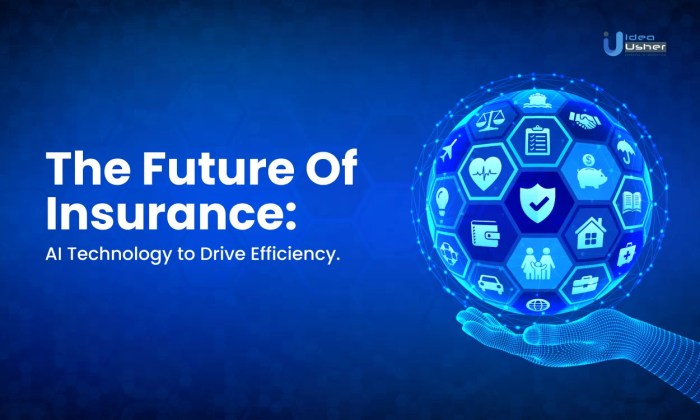As the future of insurance how AI and technology are transforming the industry takes center stage, this opening passage beckons readers with a captivating overview of the advancements reshaping the insurance landscape.
The integration of AI and technology in insurance processes is revolutionizing the way industry operates, paving the way for enhanced efficiency, personalized services, and improved customer experiences.
Introduction to AI and Technology in the Insurance Industry
Artificial Intelligence (AI) and technology have revolutionized the insurance industry, bringing about significant changes in how insurance processes are carried out. AI refers to the simulation of human intelligence in machines that are programmed to think and learn like humans.
Technology, on the other hand, encompasses a wide range of tools and systems that enable the automation and optimization of various tasks.In the insurance sector, AI and technology are currently being used for a variety of purposes, including claims processing, risk assessment, customer service, and underwriting.
These technologies help insurance companies streamline their operations, enhance decision-making processes, and improve overall efficiency.
Benefits of Incorporating AI and Technology in Insurance Processes
- Improved Accuracy: AI and technology can analyze vast amounts of data quickly and accurately, reducing errors in risk assessment and claims processing.
- Enhanced Customer Experience: Automation and AI-driven chatbots enable insurance companies to provide real-time assistance to customers, improving satisfaction levels.
- Cost Savings: By automating routine tasks and streamlining processes, insurance companies can reduce operational costs and increase profitability.
- Fraud Detection: AI algorithms can detect patterns indicative of fraudulent activity, helping insurance companies minimize losses.
- Personalized Policies: AI and technology enable insurers to create customized insurance products based on individual customer needs and preferences.
Automation in Insurance Processes

Automation plays a crucial role in revolutionizing the insurance industry by streamlining processes and enhancing operational efficiency.
Claims Processing
- AI algorithms are used to analyze and process insurance claims, reducing manual intervention and speeding up the claim settlement process.
- Automation in claims processing helps in verifying policy details, assessing damage, and determining payouts accurately.
-
By automating claims processing, insurance companies can improve customer satisfaction by providing faster claim settlements.
Underwriting
- Technology enables automated underwriting processes by analyzing vast amounts of data to assess risk and determine premiums.
- AI systems can evaluate an individual's risk profile based on various factors, such as health records, driving history, and credit scores.
-
Automated underwriting enhances accuracy and consistency in risk assessment, leading to more precise pricing and minimized risks for insurers.
Premium Calculations
- Machine learning algorithms are used to calculate premiums based on personalized data and risk factors.
- Automation in premium calculations ensures that policyholders receive fair and competitive pricing tailored to their specific needs.
-
AI-driven premium calculations enable insurers to optimize pricing strategies and remain competitive in the market.
Personalized Insurance Products and Services
In today's digital age, AI and technology have revolutionized the insurance industry, allowing for the creation of personalized insurance products and services tailored to individual customer needs. This customization not only enhances the customer experience but also increases customer satisfaction and retention rates.
Role of Data Analytics in Tailoring Insurance Offerings
Data analytics plays a crucial role in the customization of insurance products and services. By analyzing vast amounts of data, including customer demographics, behavior patterns, and preferences, insurance companies can gain valuable insights into individual needs. This data-driven approach enables insurers to develop personalized offerings that meet specific requirements, resulting in a more tailored and relevant insurance experience for customers.
- Utilizing advanced algorithms and machine learning, insurers can assess risk factors more accurately and determine personalized coverage options.
- By leveraging real-time data, insurers can adapt insurance policies in response to changing circumstances, providing customers with greater flexibility and control over their coverage.
- Data analytics also enables insurers to identify potential fraud more effectively, ensuring that personalized insurance products are offered to legitimate customers.
Impact of Personalized Insurance on Customer Satisfaction and Retention
The shift towards personalized insurance products and services has a significant impact on customer satisfaction and retention rates. Customers are more likely to feel valued and understood when they receive insurance solutions that are specifically tailored to their needs. This personalized approach fosters a sense of trust and loyalty, leading to higher customer satisfaction levels and increased retention rates
By offering personalized insurance products and services, insurers can enhance the overall customer experience, leading to improved satisfaction and retention rates.
Fraud Detection and Prevention
AI and technology are revolutionizing fraud detection and prevention in the insurance sector, enabling companies to identify and combat fraudulent activities more effectively than ever before.
AI Tools for Fraud Detection
- Machine Learning Algorithms: AI-powered algorithms analyze vast amounts of data to detect patterns indicative of potential fraud.
- Behavioral Analytics: AI tools monitor and analyze user behavior to identify anomalies that may signal fraudulent activity.
- Predictive Modeling: AI utilizes historical data to predict future fraudulent behavior and take proactive measures to prevent it.
Benefits of AI in Fraud Detection
- Improved Accuracy: AI systems can detect fraudulent patterns with higher accuracy and efficiency compared to manual methods.
- Real-time Detection: AI tools can detect fraud in real-time, allowing insurers to intervene quickly and minimize losses.
- Cost Savings: By automating fraud detection processes, insurers can reduce operational costs associated with manual investigations.
Customer Experience and Engagement
AI and technology have revolutionized customer experience and engagement in the insurance industry, providing personalized and efficient services to policyholders. The use of chatbots and virtual assistants has played a key role in enhancing customer interactions, making it easier for clients to access information and receive support in real-time.
Role of Chatbots and Virtual Assistants
Chatbots and virtual assistants have become integral in transforming customer service within the insurance industry. These AI-powered tools can provide instant responses to customer queries, guide clients through the claims process, and offer personalized recommendations based on individual needs. By automating routine tasks and providing 24/7 support, chatbots and virtual assistants enhance customer engagement and satisfaction.
Impact on Client Satisfaction and Loyalty
AI-driven customer service has a significant impact on client satisfaction and loyalty. By offering personalized recommendations, proactive communication, and efficient claim processing, insurance companies can build stronger relationships with their customers. The ability to provide timely and relevant support through chatbots and virtual assistants leads to higher customer satisfaction levels and increased loyalty to the insurance provider.
Risk Assessment and Underwriting
AI and technology have completely transformed the way risk assessment and underwriting are conducted in the insurance industry. These advancements have enabled insurance companies to analyze data more efficiently, accurately assess risks, and customize coverage for each policyholder.
AI Algorithms for Risk Evaluation
- Machine Learning Algorithms: AI algorithms are used to analyze vast amounts of data to identify patterns and predict future outcomes. This helps insurers assess risks more accurately and efficiently.
- Natural Language Processing (NLP): NLP algorithms can analyze unstructured data from policy documents, claims history, and customer interactions to extract valuable insights for risk assessment.
- Telematics Data Analysis: Insurers use AI algorithms to analyze telematics data from connected devices to assess the driving behavior of policyholders and adjust premiums accordingly.
Implications of AI-Powered Risk Assessment
- Insurance Pricing: With AI-powered risk assessment, insurance companies can offer more personalized pricing based on individual risk profiles. This leads to fairer premiums for customers and reduces the chances of overpaying for coverage.
- Coverage Customization: AI enables insurers to tailor coverage options based on the specific needs and risks of each policyholder. This results in more relevant and comprehensive insurance policies that provide adequate protection.
- Efficiency and Accuracy: By automating risk assessment processes with AI, insurers can eliminate human biases, reduce errors, and speed up underwriting decisions. This not only improves operational efficiency but also enhances the overall customer experience.
Final Wrap-Up

In conclusion, the future of insurance is intricately linked with the rapid evolution of AI and technology, promising a more streamlined, customer-centric, and secure industry. As the landscape continues to shift, embracing these innovations will be crucial for insurance companies aiming to stay competitive and relevant in a dynamic market.
Key Questions Answered
How are AI and technology improving customer experience in the insurance industry?
AI and technology enable personalized interactions, quicker response times, and efficient claim processing, leading to enhanced customer satisfaction and loyalty.
What are some examples of AI tools used for fraud detection in insurance?
AI tools like predictive analytics, anomaly detection, and machine learning algorithms are commonly used to identify and prevent insurance fraud.
How does AI impact risk assessment and underwriting in the insurance sector?
AI streamlines risk evaluation processes, utilizing advanced algorithms to assess risks more accurately and efficiently, ultimately influencing insurance pricing and coverage decisions.












